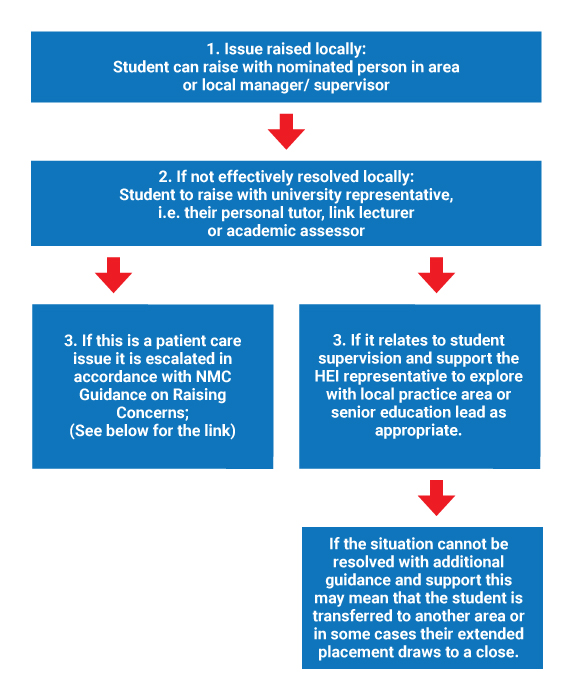

Guidance regarding practice support for deployed nursing students during the COVID-19 emergency.
1.0 Introduction
1.1 NMC Guidance
1.2 HEE Guidance
1.3 NHS Staff Council Guidance
2.0 Preparation for Practice
3.0 Student Support from the HEI
3.1 Student Health and Well-Being
4.0 Induction/Orientation to Practice
4.1 Induction Period Considerations
5.0 Student Support in Practice
5.1 Completing the Practice Assessment Document
5.2 Escalating concerns process for students
Nursing and Midwifery students have been invited to volunteer to undertake an extended placement.
This includes:
Year 2 nursing and midwifery students or those in the first six months of the third year of their degree programme or first year postgraduate students These students may spend no more that 80% of their hours in clinical placement and 20% of their hours in theoretical learning, hence equivalent to 30 hrs a week in clinical practice.
Year 3 nursing and midwifery students in the final six months of their pre-registration programmes. These students may do up to 100% in practice (some HEIs have agreed an 80/20% split) and complete their programmes in clinical placements, while ensuring all learning outcomes are met. (See section 1.3 re NHS Staff Council temporary job descriptions)
The NMC is also exploring a Covid-19 temporary register for nursing students who are in the last six months of their programme in the event that a ‘state of emergency’ is declared. This is currently not available. If this does occur students can volunteer to enter this temporary register as a Band 5 but transition to the Band 5 will involve discussion between the HEI and partner organisation regarding the students’ level of performance and capability. (See section 1.3 re NHS Staff Council temporary job descriptions)
1.1 What are the NMC saying about support and supervision in practice.
The Nursing and Midwifery Council outlined their guidance regarding student supervision and support in their ‘Emergency standards for nursing and midwifery education’ published on 25th March 2020.
Some key areas include:
NMC (2020)
www.nmc.org.uk/standards-for-education-and-training/emergency-education-standards/
The NMC statement have also produced a statement on personal protective equipment during the Covid-19 pandemic (See link below)
www.nmc.org.uk/news/news-and-updates/nmc-statement-on-personal-protective-equipment-during-the-covid-19-pandemic/
1.2 Health Education England have also published guidance in March 2020 that states that these students will be employed in clinical practice working with appropriate support and supervision within an appropriate delegation framework. See link to HEE document ‘Student Support Guide’.
HEE (2020)
www.hee.nhs.uk/sites/default/files/documents/Student%20support%20guide%20master%20.pdf
1.3 On 07.04.20 the NHS Staff Council produced temporary job descriptions and guidance for deployed nursing students. These have been shared with all potential employers and include reference to two groups of students:
NHS Employers (2020) NHS Staff Council advice on job descriptions and banding of nursing.
www.nhsemployers.org/-/media/Employers/Documents/COVID19/NHS-Staff-Council-advice-job-descriptions-and-banding-of-nursing-students.pdf?la=en&hash=12AD2E919FE425704985AB47BB75DC2C66BD5461
These three documents are referred to in the guidance:—
NMC (2020) Emergency standards for nursing and midwifery education
HEE (2020) Student Support guidance during COVID-19 Outbreak
NHS Employers (2020) Staff Council advice on job descriptions and banding of nursing

The CapitalNurse programme team have developed resources and identified relevant e-learning for healthcare modules to support returners to practice which are equally relevant to support student learning and assessment. These can be accessed via this link:
www.hee.nhs.uk/our-work/capitalnurse/back-clinical-practice-covid-19
Each HEI will have directed students to a range of support mechanisms and resources that can be accessed via their university virtual learning pages. Each practice organisation will also have access to a number of resources that students can access locally. HEE direct students to the NHS Employers free access to wellbeing apps for all NHS staff:
www.nhsemployers.org/news/2020/03/free-access-to-wellbeing-apps-for-all-nhs-staff
Further resources are being developed to enhance student and staff support across London and these will be included here once available.
Each HEI has been keeping students fully informed of the guidance and standards that have been distributed in the preparation for undertaking extended placements and their deployment to work in various practice settings. This has included the Public Health England, NHS and World Health Organisation guidance regarding COVID-19.
Programmes have continued to be delivered online with many students accessing simulated skills sessions virtually.
In addition to specific preparation and guidance given by the individual HEIs discussion with the CapitalNurse programme team has resulted in the identification of some resources they have developed to support returners to practice but which are equally relevant to support student learning and assessment. Some examples are provided below though e-learning for healthcare modules can also be accessed via this link:
www.hee.nhs.uk/our-work/capitalnurse/back-clinical-practice-covid-19
The following learning resources on this page may be particularly helpful in supporting student learning:
All HEIs have clearly structured frameworks of support that students will be made aware of and know how to access.
Each HEI will take responsibility for supporting their own students – wherever they are on placement.
This is essentially a three-pronged approach as outlined below
3.1 Student Health and Well-being
Initial support from the HEI related to the student placement are highlighted above and each HEI will have directed students to a range of support mechanisms and resources that can be accessed via their university virtual learning pages. Each practice organisation will also have access to a number of resources that students can access locally. As other links are developed they will appear on the PLPLG website (See www.plplg.uk)
If a practice supervisor identifies that a student requires additional guidance or support they should contact the identified university representative.
We appreciate that all organisations are planning some form of induction for deployed students. Students who are being deployed to an organisation that they have never previously worked in will require a more comprehensive induction to familiarise themselves with that organisation. Students will be required to wear their university student uniform during this period as well as their university identification badge.
The orientation checklist in the practice assessment document outlines the following areas to be included in the area orientation:
4.1 After the initial orientation during the induction period the following needs to be considered.
As per HEE and NMC guidance students must receive the support and supervision required to support their learning and in accordance with NMC guidance protected learning time must be provided. The NMC also state the following:
To meet the requirements for protected learning time we are proposing that students are:
5.1 Completing the Practice Assessment Document (PAD)
Each PAD is referred to as a Part and there are three Parts to be completed during the programme. There are four key components in the Nursing PAD:
Many year 2 and year 3 students will still be required to meet certain components of their PAD in order to meet the NMC requirements for registration.
For a number of students many of their essential skills will already have been met in previous placements and so it is important to identify which areas still need to be met to complete the Part.
Students completing Part 2 PADs (typically year 2 students) may be supported to progress and given the opportunity to meet some outstanding skills in the next academic year if they are not completed on their extended placement.
Staff are being reminded that the learning activities based on the CapitalNurse proposals for returning nurses and eLearning for health provide the theoretical underpinning for many of the essential skills that students need to complete.
For example:
Staff are reminded of the need to alert the university representative if any issues regarding student conduct and performance are identified so that a joint approach to student support can be initiated and an action plan developed if needed. The HEI process for raising concerns regarding student performance is outlined in the PAD.
Students are being advised to:
5.2 Escalating concerns process for students.
Student concerns may be related to patient safety, related to their learning experience or related to their own safety at this challenging time. All organisations have clear policies for escalating concerns as do the HEIs. The following steps should be followed:
